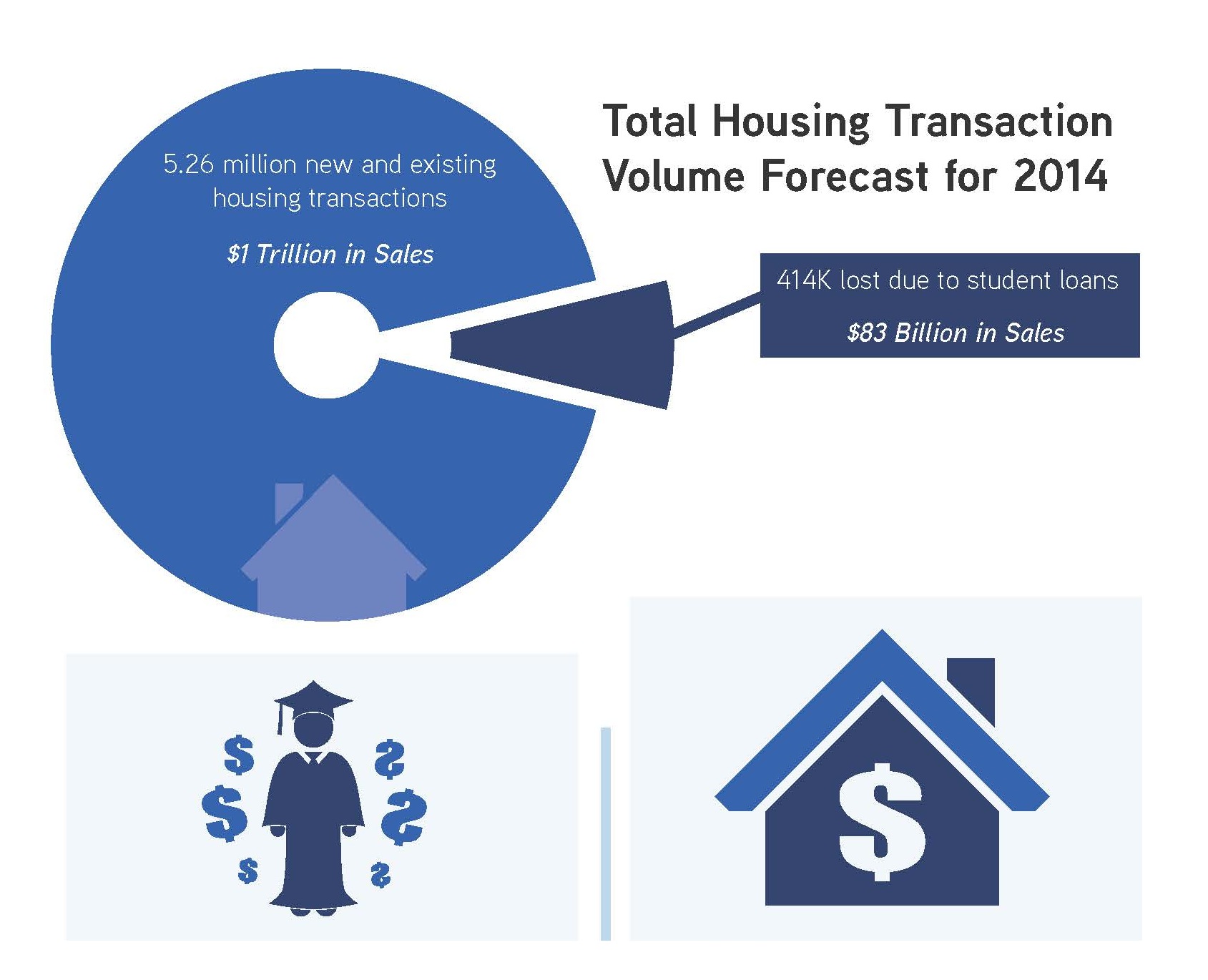Eight percent fewer homes will transact in 2014 than normal, purely due to student loan debt, according to analysis by Rick Palacios, Jr., and Ali Wolf of John Burns Real Estate Consulting.
In a new 30-page paper, the firm assesses the impact of student loans on home buying for households under the age of 40. Its conclusion: 414,000 transactions will be lost in 2014 due to student debt. At a typical price of $200,000, that equals $83 billion in lost volume.
Palacios and Wolf explain their methodology and findings:
The analysis was quite complicated and involved a few assumptions, but we believe it is conservative, primarily because we looked only at those under the age of 40 with student debt.
At a high level, the math is as follows:
• Student debt has ballooned from $241 billion to $1.1 trillion in just 11 years.
• 29 million of the 86 million people aged 20-39 have some student debt.
• Those 29 million individuals translate to 16.8 million households.
• Of the 16.8 million households, 5.9 million (or 35%) pay more than $250 per month in student loans, which inhibits at least $44,000 per year in mortgage capability for each of them.
• About 8% of the 20-39 age cohort usually buys a home each year, which would be 1.35 million transactions per year.
• Using previous academic literature as a benchmark for our own complicated calculation, we then estimated that today's purchase rate is reduced from the normal 8% depending on the level of student debt--ranging from 6.9% for those paying less than $100 per month in student loans to less than 1% for those paying over $1,300 per month. Other factors contribute to even less entry-level buying today.
While we applaud the increasing education, we need to realize that it comes with a cost known as student debt. We raised the red flag on student debt back in 2011 and continue to believe that this debt will delay homeownership for many, or at least require that they buy a less expensive home.
Related Stories
| Nov 15, 2010
Gilbane to acquire W.G. Mills, Inc.
Rhode Island-based Gilbane Building Company announced plans to acquire W.G. Mills, Inc., a construction management firm with operations based in Florida. The acquisition will dramatically strengthen Gilbane’s position in Florida’s growing market and complement its already established presence in the southeast.
| Nov 11, 2010
Saint-Gobain to make $80 million investment in SAGE Electrochromics
Saint-Gobain, one of the world’s largest glass and construction material manufacturers, is making a strategic equity investment in SAGE Electrochromics to make electronically tintable “dynamic glass” an affordable, mass-market product, ushering in a new era of energy-saving buildings.
| Nov 11, 2010
Saint-Gobain to make $80 million investment in SAGE Electrochromics
Saint-Gobain, one of the world’s largest glass and construction material manufacturers, is making a strategic equity investment in SAGE Electrochromics to make electronically tintable “dynamic glass” an affordable, mass-market product, ushering in a new era of energy-saving buildings.
| Nov 11, 2010
USGBC certifies more than 1 billion square feet of commercial space
This month, the total footprint of commercial projects certified under the U.S. Green Building Council’s LEED Green Building Rating System surpassed one billion square feet. Another six billion square feet of projects are registered and currently working toward LEED certification around the world. Since 2000, more than 36,000 commercial projects and 38,000 single-family homes have participated in LEED.
| Nov 10, 2010
$700 million plan to restore the National Mall
The National Mall—known as America’s front yard—is being targeted for a massive rehab and restoration that could cost as much as $700 million (it’s estimated that the Mall has $400 million in deferred maintenance alone). A few of the proposed projects: refurbishing the Grant Memorial, replacing the Capitol Reflecting Pool with a smaller pool or fountain, reconstructing the Constitution Gardens lake and constructing a multipurpose visitor center, and replacing the Sylvan Theater near the Washington Monument with a new multipurpose facility.
| Nov 9, 2010
Just how green is that college campus?
The College Sustainability Report Card 2011 evaluated colleges and universities in the U.S. and Canada with the 300 largest endowments—plus 22 others that asked to be included in the GreenReportCard.org study—on nine categories, including climate change, energy use, green building, and investment priorities. More than half (56%) earned a B or better, but 6% got a D. Can you guess which is the greenest of these: UC San Diego, Dickinson College, University of Calgary, and Dartmouth? Hint: The Red Devil has turned green.
| Nov 9, 2010
12 incredible objects being made with 3D printers today
BD+C has reported on how 3D printers are attracting the attention of AEC firms. Now you can see how other creative types are utilizing this fascinating printing technology. Among the printed items: King Tut’s remains, designer shoes, and the world’s smallest Rubik’s Cube.
| Nov 9, 2010
U.S. Army steps up requirements for greening building
Cool roofs, solar water heating, and advanced metering are among energy-efficiency elements that will have to be used in new permanent Army buildings in the U.S. and abroad starting in FY 2013. Designs for new construction and major renovations will incorporate sustainable design and development principles contained in ASHRAE 189.1.










